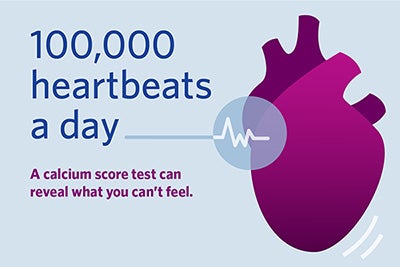
Get heart care that’s right for you in Baltimore
-
When should I talk to my doctor about my heart health?
Feeling tired or being out of breath while doing the everyday activities you usually do may be warning signs that you have a heart condition. If you have concerns about new symptoms, talk with your doctor. And if you have high blood pressure, high cholesterol or heart disease and haven’t connected with your doctor in a while, schedule an appointment today.
-
When should I have a heart scan?
Your age, gender, lifestyle and medical history play a role in your heart health. If you have symptoms of heart disease or are unsure about your risk, talk to your doctor about a heart scan. A CT heart scan can help you and your doctor better understand your risk for heart attack. The imaging test delivers a coronary calcium score based on the amount of calcium-containing plaque that has built up in your heart arteries. You may benefit from a heart scan if you:
- Are a man over age 40 or a woman over age 55
- Are a smoker or have a history of smoking
- Have a family history of heart attack at an early age
- Have diabetes
- Have high blood pressure
- Have high cholesterol
Talk with your doctor about having a coronary calcium scoring heart scan. You should not have a heart scan if you are pregnant, or have already had a heart attack, coronary bypass surgery or a coronary stent.
-
What are the symptoms of a heart attack?
For both women and men, the most common heart attack symptom is chest pain or discomfort. But women may be more likely to experience shortness of breath, nausea or vomiting, and back or jaw pain.
If you are experiencing chest pain, especially in combination with jaw or arm pain, lightheadedness, nausea, vomiting or difficulty breathing, you might be having a heart attack. Call 911 or go to the nearest emergency room right away.
Watch for these symptoms of heart attack in both men and women:
- Chest discomfort, pressure or pain
- Difficulty breathing independent of activity
- Lightheadedness or loss of consciousness
- New weakness or fatigue
- Rapid or irregular heartbeat
- Sudden pain in arm (particularly left arm), jaw, neck or back
-
What is high blood pressure?
High blood pressure, also called hypertension, is blood pressure that is higher than normal. It happens when the force of blood pushing against the walls of your arteries is too high. High blood pressure is a chronic condition that can increase your risk for heart disease and stroke. Talk to your doctor about risk factors and how to manage your blood pressure.
-
What are some signs of clogged arteries?
Clogged arteries, also known as coronary artery disease (CAD), happens when plaque, including fats and cholesterol, build up on your artery walls. Plaque buildup, called atherosclerosis, can slow or completely block blood flow to your heart. Symptoms of clogged arteries may include:
- A cold sweat
- Chest pain or discomfort (angina)
- Light-headedness
- Nausea
- Pain or discomfort in the arms or shoulder
- Shortness of breath
- Weakness
Talk to your doctor about how to reduce your risk for coronary artery disease. If you are an adult with high blood pressure and cholesterol, diabetes, obesity, use tobacco or have a family history of heart disease, your doctor may recommend getting a CT scan of your heart.
-
What are the different types of heart specialists?
A cardiologist specializes in the diagnosis of heart disease and care of the heart muscle, coronary arteries and veins that carry blood.
A heart surgeon, also called a cardiac, cardiothoracic or general thoracic surgeon, performs surgery on your heart, lungs, esophagus and other parts of your chest. Heart transplant surgeons specialize in treating heart failure with heart transplantation and ventricular assist devices (VAD).
Surgeons and cardiologists at Ascension sites of care are part of a national care team of doctors, sharing best practices and advanced treatment options for more complex heart care.
Different types of heart specialists and surgeons include:
- Cardiac rehabilitation specialist
- Cardiothoracic (heart and vascular) surgeon
- Congenital heart specialist, for children and adults
- Electrophysiologist for AFib and other heart rhythm disorders
- General cardiologist
- Heart failure specialist
- Heart transplant surgeon
- Interventional cardiologist, focuses on cardiac catheterization and minimally invasive procedures
- Nuclear cardiologist, performs advanced heart imaging
- Pediatric cardiologist, for infants, children and teens
- Pulmonary hypertension specialist
-
How do I find a cardiologist near me?
If you are looking for a cardiologist or a second opinion on a diagnosis or your care plan, we can help. You’ll find that managing long-term and chronic heart care needs is easier with a team ready to support you. Your primary care doctor can connect you with a cardiologist close to home.
 When you have a heart rhythm disorder, you need a doctor who listens. We start by understanding you, and how your heart beats. Our heart care team specializes in atrial fibrillation (AFib), a type of arrhythmia, where your heart beat is irregular, either too fast or too slow. You may feel a flutter or quiver in your chest. Other symptoms may include chest pain, sweating, fatigue, shortness of breath and weakness. Heart specialists at
When you have a heart rhythm disorder, you need a doctor who listens. We start by understanding you, and how your heart beats. Our heart care team specializes in atrial fibrillation (AFib), a type of arrhythmia, where your heart beat is irregular, either too fast or too slow. You may feel a flutter or quiver in your chest. Other symptoms may include chest pain, sweating, fatigue, shortness of breath and weakness. Heart specialists at